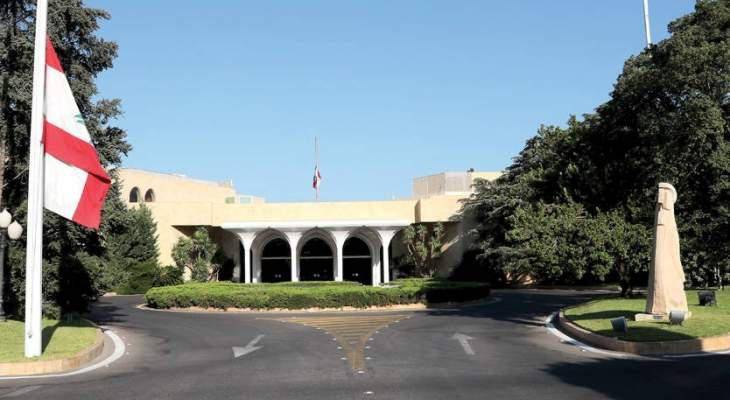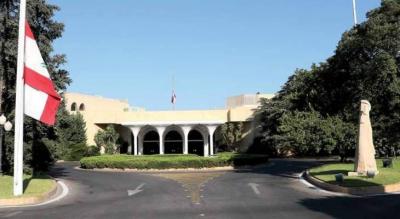In light of the indicators suggesting terrifying scenarios following the end of President Michel Aoun's term on the 31st of this month, there is serious talk about a set of measures that negate these claims, not only to restore constitutional order in the country and address the vacancy of the presidency but also to curb potential chaos in Lebanon and the region. After the border demarcation process was completed and the gas exploration and extraction project was initiated in the area, what leads to this equation? Observers of the active diplomatic movement within the country and towards it can only recognize the extent of international interest in the possible outcomes of the failed attempts to elect the next president of the republic and the formation of the upcoming government, alongside the required procedures to expedite the demarcation process. This preparation is aimed at solidifying it in stages that will certainly lead to the resumption of exploration operations in Lebanon and gas extraction in Israel, under the obligations of Lebanese, international, and UN regulations, and those required by the companies "Total Energies" and its Italian counterpart "Eni". This is all awaited until the consortium is reformed with the Qataris taking over the Russian share belonging to the company "Novatek", estimated at 20%, which has now come under Lebanese state control after the Russians left the gas fields in the Lebanese exclusive economic zone.
Amid these backgrounds, observers who spoke to "Al-Markaziyya" are awaiting the return of the American envoy Amos Hochstein to Beirut next week, in a way that heralds the final arrangements for the demarcation process, especially if he returns with Israeli approval on the scheduled date for the exchange of documents between the two countries in his presence and under his guarantee, coupled with the hosting of "UNIFIL" forces for the celebration that paves the way for the final phase of sending the documents to the United Nations for preservation and finalization as new maritime borders between the two countries.
This long-awaited significant step is the foundation on which various stakes about Lebanon's situation will be built, awaiting the delayed benefits it might bring. The stricken country is currently enduring major pulls due to ongoing disputes that pose a significant threat to security, especially if the outlined scenarios for the aftermath of President Michel Aoun's term are accurate. The growing discourse about the prior skepticism regarding the authority of the caretaker government to exercise presidential powers when the presidency is vacant adds more complexity, given that powers would collectively transition to it amid various legal opinions that lean towards manipulating the constitution and resorting to customs that grant the Prime Minister a broad margin of authority, exceeding what is permitted in a personal duel that surpasses what is allowed to showcase the “lost leadership face” of Lebanon's first Sunni leader.
This backdrop comes against the pursuit to occupy the position that former President Saad Hariri held, which Mikati has been trying to cement for several years. Hariri's recent withdrawal and freezing of his political and party work represent a rare opportunity that may not present itself again. Based on these fears, diplomatic references are wary and are showing concern for future expectations, aiming to mitigate their possible negatives after proving the failure of system leaders in navigating the presidential election event. This president could solely prevent a transition to any disorderly phase, whether constitutional, political, or security-related.
Such concerns intensify about the repercussions of the increasing illegal migration towards European coasts or other directions, raising fears among governments of those countries about the repercussions, as they have yet to absorb the magnitude of displacement resulting from the Russian invasion of Ukraine and the heavy impact it has on the continent. This comes as these countries are sequentially preparing to hold parliamentary elections following those held in Italy, which may bring a wave of intolerance and extremism that anticipates more national and religious rigidity, which most of these countries aim to avoid due to the negative responses experienced by several European capitals from suicide and terrorist operations previously unknown in their regions amidst the spread of Islamists labeled as terrorists through illegal migration.
Amid these calculations and their regional and international ramifications, there is a serious concern that, should predictions hold true regarding what the Free Patriotic Movement intends to do if a government is not formed before the end of President Aoun's term, it could lead to a scenario where the vacant presidency transitions to caretaker powers, backed by a range of legal opinions prepared by the caretaker Prime Minister to exercise authority in a manner that may provoke many. This could lead to uncalculated confrontations, especially if those planning to disrupt the security situation succeed in provoking security forces into conflicts that reignite tensions within the country.
From what is anticipated, political and security references have alerted "Al-Markaziyya" to a series of possible steps, including the talk of paralyzing the government through a boycott by ministers associated with the Free Patriotic Movement and its allies. They may refuse to attend Mikati's calls for ministerial meetings if certain expected behaviors do not progress from him, potentially leading to internal strife that is fueled by discussions of the presidential powers that have now transferred to the Sunni president.
Accordingly, diplomatic references interpret some threatening steps by Bassil and some parties allied with Syria, who raise the banner of issues concerning Syrian refugees, with their rhetoric likely to escalate if a new government is not formed. This might lead to Minister of Displaced Persons Issam Sharafeddine exploiting this sensitive issue to blame Prime Minister Mikati, considering their shared discord, which could steer the country into a phase where the saying "Against me and my enemies, O Lord" applies, potentially adding a new meaning departing from the logic of "I care not for what any decision or direction may lead to after the end of the term... and after me, the flood."




